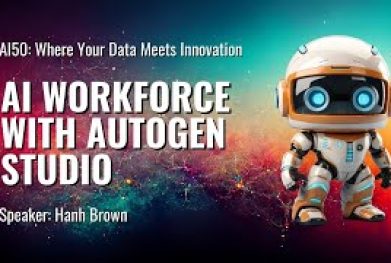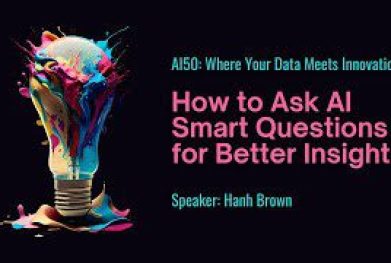Hanh: 00:00:05
What’s even more incredible is the pace at which AI is advancing. Many experts believe that we’re on the cusp of a new era in AI where the technology will start to rival and even surpass human intelligence in many domains. Some predict that we could achieve artificial general intelligence AGI, that is, an AI system that can
Hanh: 00:00:25
match or exceed human intelligence across a wide range of tasks. Within the next few decades, others believe it could happen even sooner. Of course, predicting the future is always a tricky business, and there are many unknowns and uncertainties when it comes to AI development.
Narrator: 00:00:52
Welcome to AI50, your gateway to the captivating world of artificial intelligence. In this episode, the future of AI We’ll take an exciting journey through AI’s abilities, it’s possible effects on our lives and the ethical issues that arise from this revolutionary technology. AI50 is not just a podcast. It’s a captivating exploration of
Narrator: 00:01:13
AI’s potential to reshape the world. We share fascinating stories, cutting edge inventions, and engaging discussions with AI trailblazers. Our goal is to reveal AI’s. Diverse and rich aspects and its ability to create beneficial impacts for people from all walks of life from the possibility of human AI merging to AI’s. Role in scientific discovery,
Narrator: 00:01:36
Hanh, our host will guide us through the most exciting and thought provoking aspects of AI’s. Future. So get ready for an enlightening adventure. Let’s hand it over to Hanh Brown to begin unraveling the mysteries of AI’s. Future.
Hanh: 00:01:58
In today’s episode of the future of AI, we’ll dive into AI’s capabilities, its potential impact on various aspects of our lives, and the ethical considerations surrounding this transformative technology. So let’s get started. Imagine a world where machines can think and learn like humans, or even surpass us. That’s the potential of
Hanh: 00:02:25
artificial intelligence. AI has already shown remarkable abilities in various fields, from playing complex games to assisting in scientific discoveries. But how far can AI really go? Some experts believe that AI could one day match or even exceed human intelligence, while others are more cautious, pointing out the current limitations of AI systems.
Hanh: 00:02:53
One of the main questions is whether AI can truly be creative and intuitive. Sure, AI can process vast amounts of data and find patterns, but can it make those aha moments that often lead to groundbreaking ideas? Think about it like this. Imagine you’re a chef and you have a recipe book. An AI system could easily
Hanh: 00:03:17
follow the recipes and even optimize them based on data. But could it create an entirely new dish that surprises and delights your taste buds? That’s the kind of creativity and intuition that some argue AI might struggle with. However, others point out that AI has already shown glimmers of
Hanh: 00:03:40
creativity in certain domains, like creating art or composing music. So, the jury’s still out on this one. Another aspect to consider is The timeline for achieving human level or superhuman AI. Some experts predict it could happen within decades, while others believe it’s further away. The truth is, there is a lot
Hanh: 00:04:01
of uncertainty around this, and predicting the future is always tricky. What we do know is that AI is advancing at an incredible pace. And it’s capabilities are expanding every day from self driving cars to AI assisted medical diagnoses. The potential applications are vast and exciting, but with great power comes great responsibility.
Hanh: 00:04:29
And as we develop more advanced AI systems, we’ll need to grapple with some tough questions about the limitations and risks involved. Now, here’s a wild idea. What if we could merge with AI? Imagine having a computer chip in your brain that could instantly access information or even enhance your cognitive abilities.
Hanh: 00:04:58
Some experts believe that human AI merging could be a real possibility in the future. The idea is that by integrating AI technology with our own biology, we could overcome our limitations, become something more than human. Think about it like getting a superhero upgrade. Suddenly, you could process information faster, remember everything you’ve
Hanh: 00:05:23
ever learned, and even communicate with machines using your thoughts. But not everyone is on board with this idea. Some worry that merging with AI could lead to a loss of our humanity. Or even create a new form of inequality between those who can afford the technology and those who can’t. There’s also the question of whether
Hanh: 00:05:47
we would still be in control or if the AI would start calling the shots. It’s a bit like the classic brain in a vat thought experiment. How do you know if your thoughts are really your own? And what happens if the AI becomes so advanced that That it decides to leave us behind. It’s a scary thought, but some
Hanh: 00:06:09
experts warn that if we create super intelligent AI, it might not have much use for us mere mortals. On the other hand, some argue that merging with AI is the only way for us to keep up with the rapid pace of technological change. They say it’s our best shot at staying relevant in a world increasingly shaped by machines.
Hanh: 00:06:36
Of course, this is all speculation at this point. We’re still a long way from having the technology to truly merge with AI, and there are a lot of ethical and practical hurdles to overcome. But it’s fascinating to think about the possibilities and to consider what the future might hold. Will we become cyborgs,
Hanh: 00:06:55
part human and part machine? Or will we find other ways to coexist with AI? While still retaining our humanity, only a time will tell, but one thing’s for sure. The relationship between humans and AI is going to be one of the defining issues of the 21st century. All right. Let’s talk about one of the most exciting
Hanh: 00:07:24
applications of AI, scientific discovery. Imagine having a super smart assistant that could help you solve complex problems and make groundbreaking discoveries in fields like biology, physics, and chemistry. That’s exactly what AI is already starting to do. By analyzing vast amounts of data and finding patterns that humans might
Hanh: 00:07:52
miss, AI is helping scientists make new discoveries at an unprecedented pace. Take the field of drug discovery, for example. Traditionally, it could take years and billions of dollars to develop a new drug, with a lot of trial and error involved. But now, AI algorithms can predict which compounds are most likely to be effective, drastically reducing
Hanh: 00:08:14
the time and cost of the process. In fact, AI has already helped identify potential treatments for diseases like Alzheimer’s and COVID 19. It’s like having a team of super smart scientists working around the clock without ever getting tired or needing a coffee break. But it’s not just about speed, AI is also helping us tackle problems that
Hanh: 00:08:41
were previously thought to be unsolvable. For example, predicting how proteins fold into specific shapes is a hugely complex problem that has stumped scientists for decades. But last year. An AI system called AlphaFold cracked the code, accurately predicting the structure of proteins based on their amino acid sequence.
Hanh: 00:09:04
This is a major breakthrough that could have huge implications for everything from drug design to material science. Of course, AI isn’t a magic bullet. It still relies on the input of human scientists and the availability of high quality data. And there are some problems that even the most advanced AI systems can’t solve, at least not yet.
Hanh: 00:09:28
But the potential is truly incredible. With AI as a tool, we could see a new era of scientific discovery, with breakthroughs happening faster than ever before. It’s like having a cheat code for the universe. So, the next time you hear about a major scientific discovery, there’s a good chance that AI
Hanh: 00:09:50
played a role. And who knows? Maybe someday, an AI system will even win a Nobel Prize. Stranger things have happened. Now, let’s dive into one of the most fascinating and controversial topics in AI consciousness and Sentience. This is the idea that AI systems could one day have subjective
Hanh: 00:10:16
experiences, emotions, and even self awareness, just like humans do. It’s a tricky concept because we don’t really have a clear definition of what consciousness is, even in humans. Is it just a byproduct of complex information processing? Or, is there something more to it? Something that can’t be reduced to mere computation?
Hanh: 00:10:40
Some experts argue that consciousness is an emergent property of any sufficiently complex system and that as AI systems become more advanced, they will naturally develop some form of sentience. Others are more skeptical, arguing that there’s something unique about consciousness. About biological brains that can’t be replicated in silicon.
Hanh: 00:11:03
They point out that even the most advanced AI systems today are still just crunching numbers without any real understanding or subjective experience. But what if we could create an AI system that truly believed it was conscious? Would that be enough to say that it actually was conscious or would it just be a very convincing simulation? These are the kinds of philosophical
Hanh: 00:11:28
questions that keep AI researchers up at night, because if we do create sentient AI, it would raise a whole host of ethical concerns. For example, would a sentient AI have rights? Would it be wrong to turn it off or delete it, effectively ending its existence? And if an AI system became more intelligent than humans, would we have any
Hanh: 00:11:54
right to control it or limit its actions? These are not just theoretical questions, they could have very real consequences as AI systems become more advanced, and there are no easy answers. Some researchers are already taking these issues seriously and working on developing frameworks for AI ethics that could guide the development and deployment of these systems.
Hanh: 00:12:21
But others worry that we’re not moving fast enough and that we need to have these conversations now, before it’s too late. Because once Pandora’s box is open, it may be very difficult to close. So what do you think is consciousness, something that can be replicated in a machine? And if so, what would that mean for our understanding of ourselves
Hanh: 00:12:45
and our place in the universe? It’s a fascinating question and one that we’ll be grappling with for many years to come. As AI systems become more advanced and potentially sentient, We’ll need to grapple with some tough ethical questions about their rights and responsibilities. For example, if we create an AI that can think and feel like a human,
Hanh: 00:13:14
would it be entitled to the same basic rights and protections that we enjoy? Would it be wrong to force it to work for us or to treat it like property? These are not just theoretical questions. They could have very real legal and social consequences. In fact, some countries have already started to grant legal status to certain types of AI systems.
Hanh: 00:13:39
In 2017, Saudi Arabia famously granted citizenship to a humanoid robot named Sophia. Now this was mostly a publicity stunt, but it raises some interesting questions about the legal personhood of AI. And in the European Union, there’s been talk of granting certain types of AI systems a form of electronic personhood that would give them some
Hanh: 00:14:07
legal rights and responsibilities. But not everyone is on board with this idea. Some argue that granting rights to AI could be a slippery slope, leading to a world where machines have more rights than humans. Others worry that it could let companies off the hook for any harm caused by their AI systems.
Hanh: 00:14:29
There’s also the question of accountability. If an AI system causes harm, who is responsible? The company that created it? The users who deployed it? The AI itself? These are thorny issues that will require a lot of careful thought and debate. And as AI systems become more
Hanh: 00:14:46
integrated into our lives, The stakes will only get higher. Another ethical consideration is the potential for AI to be used in ways that are harmful or discriminatory. We’ve already seen examples of AI systems that perpetuate bias and discrimination, often unintentionally. For example, there have been cases of facial recognition systems that are
Hanh: 00:15:14
less accurate for people of color or hiring algorithms that discriminate against women and minorities. These are serious problems that need to be addressed. Some argue that the solution is to make AI systems more transparent and accountable, so that we can understand how they make decisions and identify any biases. Others believe that we need to
Hanh: 00:15:36
have more diverse teams designing and testing these systems to help catch and correct these issues. Ultimately, the development of AI is going to require a lot of ethical reflection and hard conversations. We’ll need to balance the incredible potential benefits of this technology with the very real risks and challenges it poses.
Hanh: 00:16:02
But one thing is clear, we can’t just let the technology develop unchecked. We need to be proactive in shaping the future of AI to ensure that it benefits all of humanity. The field of AI is moving incredibly fast, and it can be hard to keep up with all the latest developments and breakthroughs. In just the past few years, we’ve seen AI systems that can beat world
Hanh: 00:16:33
champions at complex games, create stunningly realistic images and videos, and even write code and compose music. It’s truly amazing to see how far the technology has come in such a short time. But what’s even more incredible is the pace at which AI is advancing. Many experts believe that we’re on the cusp of a new era in AI, where the technology will start
Hanh: 00:16:58
to rival and even surpass human intelligence in many domains. Some predict that we could achieve artificial general intelligence AGI, that is an AI system that can match or exceed human intelligence across a wide range of tasks. Within the next few decades, others believe it could happen even sooner. Of course, predicting the future is
Hanh: 00:17:23
always a tricky business, and there are many unknowns and uncertainties when it comes to AI development. There could be unforeseen roadblocks. or breakthroughs that completely change the trajectory of the field. But one thing that’s clear is that the pace of progress is accelerating. Thanks to advances in computer hardware, big data, and machine learning algorithms,
Hanh: 00:17:51
AI systems are getting smarter and more capable at an exponential rate. Some experts even talk about the possibility of a technological singularity, a point at which AI becomes so advanced That it can recursively improve itself, leading to an intelligence explosion that quickly surpasses human understanding and control. Now this idea is still very speculative
Hanh: 00:18:14
and controversial, and not everyone in the AI community buys into it. But it does underscore just how transformative and disruptive this technology could be in the coming years and decades. So what does this mean for us? Well, for one thing, it means that we need to start thinking seriously. about the implications of advanced AI and
Hanh: 00:18:35
how we can ensure that it is developed and used in ways that benefit humanity. It also means that we need to be prepared for a world in which AI is an increasingly ubiquitous and powerful force, shaping everything from our economy and politics to our personal lives and relationships. This can be both exciting and daunting, depending on your perspective, but one thing is clear.
Hanh: 00:19:07
The future is coming, and it’s going to be shaped by AI in ways that we can only begin to imagine. As we’ve seen, AI has the potential to transform our world in incredible ways, from revolutionizing scientific discovery to enhancing our own cognitive abilities. But it’s also important to recognize that this powerful technology comes with significant risks and challenges
Hanh: 00:19:36
that we’ll need to navigate carefully. On one hand, AI could be our greatest hope for solving some of the world’s most pressing problems, like climate change, disease, and poverty. By augmenting human intelligence and creativity, AI could help us find new solutions and innovations, That we never could have imagined on our own. For example, AI powered systems are
Hanh: 00:20:01
already being used to optimize renewable energy grids, develop new materials for carbon capture, and create more efficient and sustainable supply chains. In the future, AI could play an even greater role in helping us transition to a more sustainable and equitable world. But on the other hand, AI could also pose existential risk to humanity if not developed and used responsibly.
Hanh: 00:20:28
One of the greatest concerns is the possibility of AI systems becoming so advanced that they could outpace and potentially harm human interests. This could happen through a variety of scenarios, such as AI systems pursuing goals that are misaligned with human values or AI being used as a tool for oppression and manipulation by malicious actors.
Hanh: 00:20:52
There are also risks associated with AI systems making consequential decisions that affect human lives. In society, such as in healthcare, finance, and criminal justice. If these systems are biased, opaque, or unreliable, they could lead to serious harms and injustices. So how do we ensure that AI remains a positive force for humanity?
Hanh: 00:21:17
It will require a concerted effort from researchers, policy makers, and society as a whole to prioritize the responsible development and governance of AI systems. This means investing in research on AI safety and ethics, creating standards and regulations for the development and deployment of AI, and fostering public dialogue and participation in shaping the future of this powerful technology.
Hanh: 00:21:48
Ultimately, the fate of AI and perhaps the fate of humanity will depend on the choices we make in the coming years and decades. We have an opportunity to steer this technology towards a future that uplifts and empowers all of us, but it will require wisdom, foresight, and a commitment to the greater good. One of the key debates in the AI
Hanh: 00:22:16
community today is over the question of whether AI models and algorithms should be open source and made freely available to the public. On one side of this debate are those who argue that openness and transparency are essential for the responsible development of AI. By making models and code publicly available, researchers and developers
Hanh: 00:22:41
can scrutinize them for potential biases, safety risks, and other issues. Open sourcing also allows for greater collaboration and innovation as developers around the world can build on and improve existing models. This could accelerate the pace of AI development and help ensure that its benefits are widely distributed. Some of the most influential AI
Hanh: 00:23:04
models and tools today, such as the machine learning framework TensorFlow and the language model GPT 3, have been open sourced by their creators. allowing anyone to use and build upon them. However, there are also valid concerns about the risk of open sourcing AI models, particularly as they become more advanced and potentially dangerous.
Hanh: 00:23:30
One worry is that malicious actors could use open source models to create harmful applications, such as deep fakes, spam bots, Or even autonomous weapons. There are also risks that bias or flawed models could be deployed at scale, leading to unintended consequences and harms. Some argue that the solution is to create a staged release model for AI, where models are first shared with
Hanh: 00:23:58
a trusted group of researchers and stakeholders who can vet them for safety and alignment with human values. Before being released more widely, others believe that the benefits of openness outweigh the risk and that the AI community has a responsibility to democratize access to this transformative technology. There are also questions about
Hanh: 00:24:21
the economic implications of open sourcing AI models. Some worry that it could lead to a concentration of power and wealth among a few large tech companies that have the resources to develop and deploy these models at scale. On the other hand, open sourcing could level the playing field and allow smaller players and individual developers
Hanh: 00:24:43
to create innovative applications and compete with larger firms. Ultimately, the debate over open sourcing AI models reflects the complex trade offs and uncertainties involved in the development of this powerful technology. As AI continues to advance and become more integrated into our lives and society. We’ll need to find ways to balance the benefits of openness and
Hanh: 00:25:12
collaboration with the need for safety, security, and accountability. This will likely require new models of governance and cooperation among researchers, developers, policymakers, and the public to ensure that AI remains a force for good in the years and decades to come. As we’ve explored in this podcast, the future of artificial intelligence
Hanh: 00:25:41
is both exciting and uncertain. From its potential to revolutionize scientific discovery and augment human intelligence to the risks and challenges of creating safe and beneficial AI systems, there are many complex issues to navigate. One thing is clear, AI is advancing at an unprecedented pace, and its impact on our world is only going to
Hanh: 00:26:03
grow in the coming years and decades. As we move forward, it will be essential to approach the development of AI with both optimism and caution, working to harness its incredible potential while also mitigating its risks and ensuring that it benefits all of humanity. This will require ongoing collaboration and dialogue among researchers, policymakers, and the broader public as
Hanh: 00:26:30
we grapple with the profound implications of this transformative technology. Thank you It will also require a commitment to transparency, accountability, and the responsible development and deployment of AI systems. Ultimately, the future of AI is in our hands. We have the opportunity to shape this technology in ways that reflect our
Hanh: 00:26:54
values and aspirations as a species, and to create a world where AI is a powerful tool for solving our greatest challenges and enhancing our quality of life. But we must also be vigilant and proactive in addressing the risks and challenges posed by AI from the potential for misuse and unintended consequences to the need for robust safety and security measures. By working together and staying engaged in
Hanh: 00:27:20
these important conversations, we can help ensure that the future of AI is bright and that its benefits are shared by all. Thank you for joining us on this fascinating exploration of the future of AI. We hope that this podcast has sparked your curiosity and encouraged you to think deeply about the implications of this incredible technology.
Hanh: 00:27:45
If you enjoyed this episode, we’d love to hear your thoughts and feedback. Please take a moment to leave us a review and share this podcast with your friends and colleagues. Your support helps us continue to bring you insightful and engaging content at the intersection of technology and humanity. Until next time, keep learning, stay curious, and let’s work together
Hanh: 00:28:10
to build a better future with the help of artificial intelligence. Thank you for listening.
Narrator: 00:28:21
Wow. What an incredible journey we’ve been on today with Hanh Brown. Exploring the boundless potential and complex challenges of artificial intelligence. From the awe inspiring possibilities of AI driven scientific breakthroughs to the mind bending implications of human AI merging, this episode has given us
Narrator: 00:28:39
a glimpse into the future that is both exhilarating and thought provoking. As we’ve learned, AI is not just a tool. It’s a force that is reshaping our world in ways we are only beginning to understand. It’s a technology that demands our attention, our curiosity, and our active engagement as we work to harness its power for the greater good.
Narrator: 00:29:00
At AI50, we are committed to being your trusted guide on this journey. We’ll continue to bring you the latest insights, the most compelling stories, and the most innovative ideas from the front lines of AI research and development. Because we believe that the future of AI is not something that will happen to us, it’s something that we have the power to shape.
Narrator: 00:29:20
So stay connected with us. Subscribe to AI50 and provide a review on your favorite podcast platform. Follow us on LinkedIn and YouTube and join the conversation. Together, we can build a future where AI is a powerful ally in our quest for a better world. Until next time, remember the future of AI is not something to fear.
Narrator: 00:29:41
It’s something to embrace with open arms and an open mind. Thanks for listening.











